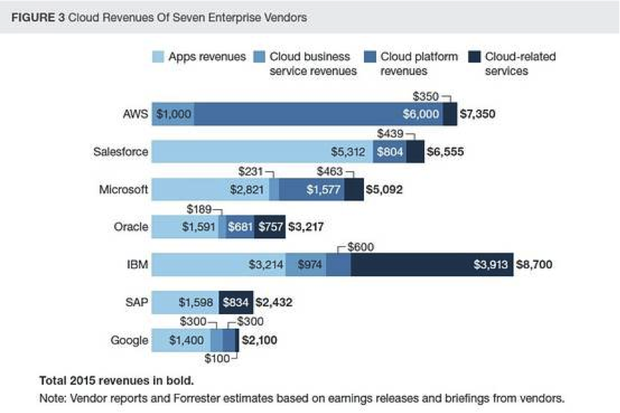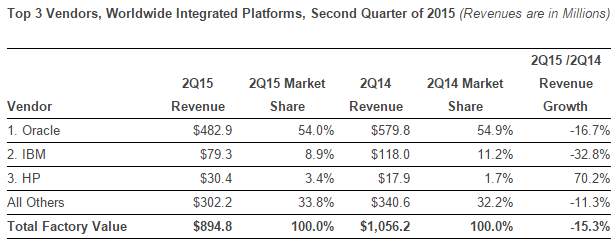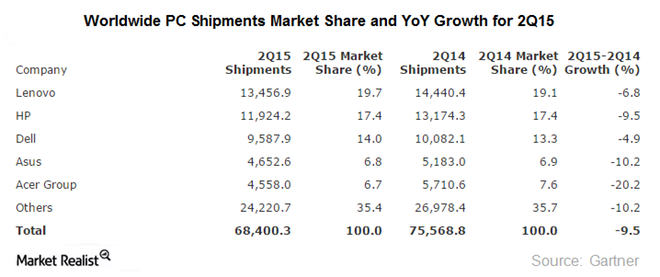
Everybody is talking about EMC. Meg is. Ginny is. The news (clearly) is. Nobody knows what the end picture will look like, but wow… that sure is a chunk of debt (interest payments alone are $2.5B annually).
While attention is focused on EMC, IBM is about to release their Q3 results. Could this be the bottom for their losses?
Microsoft is making grounds in the cloud space against Amazon while Red Hat announces a new acquisition in Ansible.
IBM
- IBM’s Q3 Earnings Around the Corner: What’s in the Cards?
We believe that revenues are likely to be affected in the near term as the company is currently transitioning to higher-growth markets that are not yielding enough to offset declines in traditional segments.
http://www.nasdaq.com/article/ibms-q3-earnings-around-the-corner-whats-in-the-cards-cm531394
- Apple users need a lot less help than PC users, IBM finds
Only 5% of IBM employees with MacBooks need help desk support from the IT department, versus 40% of PC users.
http://www.businessinsider.com.au/apple-macbook-needs-help-desk-less-windows-pc-ibm-2015-10
They are also scaling up their Apple purchases to 200,000
http://tech.firstpost.com/news-analysis/ibm-is-smitten-by-apple-orders-50000-macbooks-to-scale-up-to-200000-over-the-year-284896.html - IBM CEO Ginni Rometty also cool on EMC/Dell
Some of Rometty’s remarks are to be expected: what CEO would concede that a rival’s structure offers it an advantage? But they also raise a decent question about how Dell/EMC’s future plans once the acquisition is bedded down. IBM’s demonstrably tooling up for cloud. Dell/EMC looks like it is all about milking the demonstrably dwindling future of on-premises IT.
http://www.theregister.co.uk/2015/10/14/size_isnt_important_says_ibms_ginni_rometty_of_emcdell/ - Could Dell-EMC Deal Push Lenovo To Acquire IBM’s Storage Business?
Lenovo has been vocal about its strategy to gain market share by beating competitors on price. Now, according to the TBR report, it will need to come up with an “immediate competitive response” to the blockbuster merger in order to overcome the strategic challenges the deal creates for the development of its data center business.
EMC
- Dell-EMC: What Storage Customers Should Do
This shouldn’t panic users, but users — especially big ones and those whose software or infrastructure stacks are dependent on particular Dell or EMC products — should take the year or so that it will take before Dell-EMC is fully baked to reevaluate their infrastructure vendor list and product choices. One of my close friends, who runs storage at a company that spends several million dollars a year with EMC told me he got an email from senior management asking how the deal might affect their company; their plan is to add another storage vendor to hedge their bets.
http://www.networkcomputing.com/storage/dell-emc-what-storage-customers-should-do/a/d-id/1322681
- Why Did VMware (VMW) Plunge 8.1% on EMC-Dell Deal?
An important thing to note here is that Dell will not be offering the regular trading stocks for VMware. Instead, the company will be issuing tracking stock that would reflect the performance of the trading stock. This will entitle EMC shareholders to have only economic interest in the trading stock but not own them (that is no voting rights or dividends). The absence of rights also makes some analysts speculate that the tracking stock might likely trade at a discount to the trading stock.
http://www.zacks.com/stock/news/193486/why-did-vmware-vmw-plunge-81-on-emcdell-deal
- EMC acquisition: Is it a good deal for Dell?
Both vendors have acquired higher value software, although VMware eclipses all the software deals of Dell such as SecureWorks and Quest. Yet for the deal to work, its needs to benefit from economies of scale and this will probably mean a reduction in headcount and product portfolio where there is duplication. Mid-level marketing, sales and administrative tasks are also ripe for some cost cutting. But nobody should expect a repeat of the bloodbath happening at HP which says it expects to cut 58,000 jobs by end of fiscal year 2015. Dell is already pretty lean as is EMC. The federation model of EMC also means that that headline staffing numbers are relatively svelte as it stands.
http://www.channelpro.co.uk/opinion/9496/emc-acquisition-is-it-a-good-deal-for-dell
HP Enterprises
- HP boss Meg Whitman trashes Dell’s EMC deal
The HP chief believes the Dell-EMC deal will be a “massive undertaking and an enormous distraction for employees and their management team.” She pointed to “disruptive” efforts to merge the companies products that will cause “chaos.
http://money.cnn.com/2015/10/12/investing/dell-emc-hp-meg-whitman/index.html
Other
- Red Hat Is Buying IT Automation Startup Ansible, For $150M
Ansible has made a name for itself as a specialist in OpenStack clouds — earlier this year it spearheaded apartnership with Cisco, HP, CSC and RackSpace in aid of this. Red Hat’s acquisition of Ansible is the company’s signal of how it hopes to expand further into OpenStack itself, as part of its wider ambitions in hybrid cloud management, OpenStack and containers.
- Microsoft Azure doubles its lead over Oracle, IBM
But the metric that really matters most—customer adoption, measured by customer cash—has only become apparent more recently, in a new Forrester report. In that report, AWS’ dominance is confirmed, but it also reveals that Microsoft is well ahead of its next nearest rivals, with roughly $1.5 billion in cloud platform revenue:

http://www.techrepublic.com/article/microsoft-azure-doubles-its-lead-over-oracle-ibm/
Photo: Frank Park







